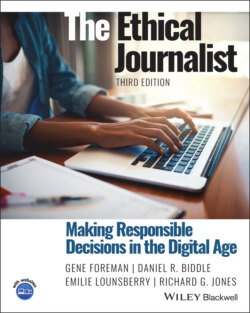Читать книгу The Ethical Journalist - Gene Foreman - Страница 23
Honing Skills Through Cases
ОглавлениеThe case‐study method gives you a chance to work through difficult decisions in the classroom without consequences and without deadline pressure. The experience will prepare you for making on‐the‐spot ethical decisions in the real world. Each of the case studies selected for class discussion is intended to teach an important nuance about news media ethics.
In addition to explaining the principles of journalism ethics and teaching a decision‐making process, this course in journalism ethics gives you two valuable opportunities:
You can study the thinking of academics and experienced practitioners on recurring problems that journalists face. You can draw on the trial‐and‐error efforts of people who have gone before you in the profession.
You can practice your decision‐making technique in a classroom setting where no one is hurt if a decision proves to be flawed. Just as a musician, an actor, or an athlete improves through practice, you benefit by thinking through the courses of action you might take in the case studies. You should emerge from the course with a deeper understanding of the challenges of the profession and with more confidence about your own decision‐making.
You should also keep in mind that an applied‐ethics course prepares you for a career in which you will be dealing with people who want to influence the way you report the news. Because journalists work for the public, it would be a betrayal of the public’s trust to allow themselves to be diverted from the truth. The ethicist Bob Steele describes the manipulators:
You will be stonewalled by powerful people who will deter you from getting to the truth. You will be manipulated by savvy sources who do their best to unduly influence your stories. You will be used by those with ulterior motives who demand the cover of confidentiality in exchange for their information. You will be swayed by seemingly well‐intentioned people who want to show you some favor in hopes that you, in return, will show them favoritism in the way you tell their story.5
A cautionary note is in order. Although ethical considerations may occasionally cost you a story, being an aggressive reporter and being ethical are not mutually exclusive. Keep in mind that your job is to inform your audience, and that means being a good, resourceful reporter who gets the story on the web, on the air, or into the newspaper.
Given the real‐life problems you will study in this course, it could be easy to conclude that the ethical choice is simple: Decide against publishing, broadcasting, or posting any news story that is the least bit questionable. But such a choice would itself be unethical. It would signify a failure to fulfill the journalist’s mission of informing the public.
Journalists in the United States would be rightly criticized if they climbed into a fountain to engage in a public protest. But they have the right to work unfettered by government regulation and protected by the First Amendment.
Photo by David Swanson, courtesy ofThe Philadelphia Inquirer..
